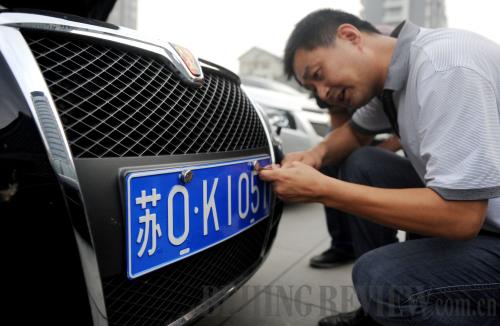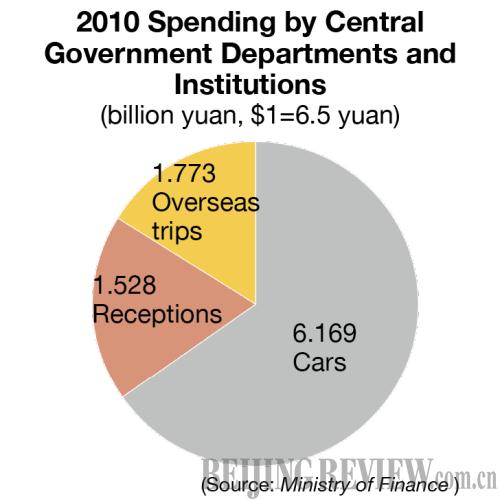|
 |
|
NO MORE PRIVILEGES: A Yangzhou Public Security Bureau worker removes a special license plate, one of 700 removed that day, from a sedan on July 20 after the province abolished its privilege system for public security officials (CHENG JIANPING) |
Reluctant to open up
Many a ministry is hesitant to just open up their records for public scrutiny. Although the State Council asked for spending disclosure in June, only a few actually followed through in July.
Some officials cling to the privileges that have brought themselves and their departments many advantages and benefits, while others are not confident about their problematic accounts and upset about possible queries from the public. They hesitate not because they don't have related budget reports and financial statements—it more or less hinges on their attitude toward administrative transparency, Wang said.
The already disclosed information is generally ambiguous and unable to be compared without payroll numbers or per-capita expenditure. Also, the absence of proportions of the three-category spending to the whole expenditure and to the fiscal allotment makes it impossible to determine whether the spending is high or within a reasonable limit. There are only numbers, not details, on the money spent.
Evasive measures and holding back the actual information will only evoke more dissatisfaction and damage these ministries' images. Disclosure will ensure effective supervision by the people and promote departmental change and reform, Wang said.
Restraints
An efficient system must be put in place to spur these departments to disclose details of their spending and encourage public supervision and criticism, Zhu said.
Institutional arrangements are also needed for information disclosure and budget approval and verification, such as stipulations on who approves the budgets, who verifies financial statements, and how to punish officials who manipulate or fudge the numbers between departments, he said.
Punishments should also be enforced to deter delays of disclosure, otherwise, the goal of budget transparency will never be achieved, he said.
But disclosure is not the goal; it's the means to the goal of administrative transparency and preventing privilege-based corruption from spreading, Zhu said.
The disclosure will not only let the people know where their money goes, but will also urge the government to practice thrifty and appropriate use of taxpayers' money, said Deng Yuwen, a senior editor with Study Times affiliated to the Party School of the CPC Central Committee.
"That's why we have to improve institutional arrangements and disclosure procedures for budget transparency with a focus on accountability," Deng said.
It's imperative to establish a constraint system and enforce severe punishment on delays and squandering of public funds, since insufficient punishment was to blame for previous failures in addressing the problem, Deng said.
Legislation is needed to iron out disclosure methods, allowing delegates to the people's congress at all levels to examine and approve the budget and work out standards on how detailed the disclosures should be, Deng said.
Improvements need to be made to the current disclosure system, such as budget classification, to avoid the use of "other expenses" in the report, and specifying the disclosure cycle and deadline.
"In doing so, it will prevent delays, defiance, or fooling the public with old accounting records," Deng said.
The budget management system should also be improved by integrating internal and external management systems, prohibiting the practice of having private coffers at local governments or government departments, Deng said.
Budgets at all levels and special funds should be included in management budgets and made public. This would include problematic items identified during the annual auditing to allow public supervision, he said.
"The people's congress at all levels should reinforce examining and supervision efforts, allowing auditing independence, and that's why we need a budget law and an auditing law as soon as possible to enforce necessary punishments," Deng said.
"Overall, we need strict stipulations, practical measures and effective mechanisms to ensure the people's rights to know, to participate in and to watch the disclosure on government spending," Deng said.

Top Spending Disclosures
Earliest and simplest disclosure: The Ministry of Science and Technology disclosed its 2011 three-category budget on April 14, 2011, which is the earliest among Central Government departments and institutions. The statement was short, only one sentence long, and said that its 2011 budget stands at 40.19 million yuan ($6.18 million).
Earliest statement on spending: The Chinese Academy of Engineering announced, on July 6, its 2010 actual spending and 2011 budget. The academy was the first to disclose figures for 2010.
Most detailed disclosure: The National Audit Office of China disclosed its 2010 spending and 2011 budget on July 11. The 1,000-word explanation and an accompanying table showed it spent 6.17 million yuan ($949,231) on overseas business trips last year, with per-capita expenses close to 16,800 yuan ($2,585), and 11.15 million yuan ($1.7 million) on vehicle maintenance, or 54,100 yuan ($8,323) for each vehicle.
Largest budget decrease: The Chinese Academy of Sciences posted the largest year-on-year decrease in its 2011 budget, 43.6 million yuan ($6.71 million), on July 8.
Largest budget increase: The General Administration of Sport of China announced the largest year-on-year increase in its 2011 budget, 14.76 million yuan ($2.27 million), on July 20.
(Compiled by Beijing Review) | 